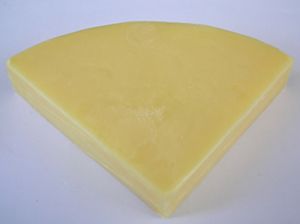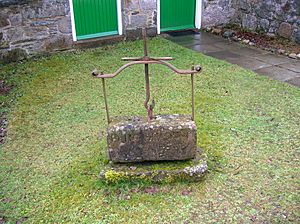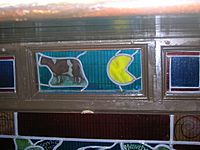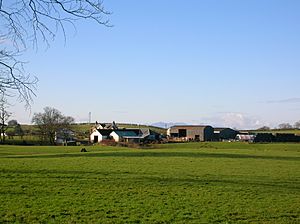Dunlop cheese facts for kids
Quick facts for kids Dunlop |
|
|---|---|
 |
|
| Country of origin | Scotland |
| Region | Ayrshire |
| Town | Dunlop |
| Source of milk | Cows |
| Pasteurised | Yes |
| Texture | Hard |
| Certification | Traditional Ayrshire Dunlop, PGI |
Dunlop is a mild and tasty cheese from Dunlop, East Ayrshire, Scotland. It's often called a 'sweet-milk cheese'. Its texture is similar to a soft Cheddar cheese.
Dunlop cheese was very popular for a long time. It became less common after the Second World War. But today, people enjoy it again! It's great in many recipes or eaten by itself.
Did you know that the famous Scottish poet, Robert Burns, loved Dunlop cheese? His friend, Jessie Lewars, said that if he came home and dinner wasn't ready, he would happily eat bread and Dunlop cheese. He would sit with his book and seem as happy as a king!
Contents
The History of Dunlop Cheese
In the early 1700s, a woman named Barbara Gilmour started making a new kind of cheese in Scotland. She used milk that still had all its cream (unskimmed milk) from Ayrshire cows. This was different from how cheese was usually made back then.
Her special way of making cheese became very popular. Soon, everyone in the area was making "Dunlop cheese." It was so good that even William Cobbett, a famous writer, said it was as good as any cheese from England!
How Barbara Gilmour Spread the Word
Barbara Gilmour was very enthusiastic about her cheese. She traveled widely to teach others how to make her Dunlop cheese. Because of her efforts, people all over Scotland wanted to buy it.
Merchants would visit the Cunninghame area to buy Dunlop cheese. They would then sell it in towns across Scotland. Local cheese sellers also bought the cheese and took it to Glasgow markets.
Dunlop Cheese Grows in Popularity
The new way of making cheese spread quickly. By the late 1700s, it was made in many parts of Scotland. Even in places where people used to make cheese from sheep's milk, they started making Dunlop cheese.
Before Barbara Gilmour, most cheese in this area was made from skimmed milk. But after her, all cheese made from unskimmed milk in western Scotland was called "Dunlop." In 1837, records show that 25,000 stones (a unit of weight) of this cheese were made in Dunlop parish every year!
What Makes Dunlop Cheese Special?
When it's young, Dunlop cheese is mild, sweet, and tastes buttery. It has a semi-soft texture. As it gets older (after a few months), it becomes firmer, almost like fudge or a hard cheese.
When it's first made, Dunlop cheese is soft and doesn't have much taste. It needs about six to twelve months to get its full, lovely flavor and smell. To do this, it must be kept in a very dry place and turned over often. This helps it age properly.
Historically, salt from the saltpans at Saltcoats was used to make Dunlop cheese. This salt contained special minerals like magnesia and Epsom Salts. These gave the cheese a unique and pleasant taste. People even debated if cheese made with cheaper imported salt could truly be called 'Dunlop' cheese!
Changes in Cheese Making
In the past, it was hard to transport fresh milk. So, farmers made butter and cheese from their milk. But when railways arrived in the 1800s, farmers could send their milk to sell far away. This meant less milk was available for making cheese. By 1866, another type of cheese, Cheddar, started to become more popular than Dunlop.
In Ayrshire, people loved to roast Dunlop cheese. They would spread it on an oat cake or scone. This, with a bowl of milk or tea, made a delicious and filling meal. In England, cheese was usually eaten "raw" with bread and mustard, often with beer. For this, drier cheeses like Cheddar were preferred.
Where is Dunlop Cheese Made Today?
The original production of Dunlop cheese stopped around 1940. It has only been made sometimes since the Second World War. However, as of 2007, Dunlop cheese is made at West Clerkland Farm near Stewarton. You can also find it made on the Isle of Arran, Islay, and other places.
The old Dunlop Cheese factory was once near the Dunlop railway station. Now, houses stand there, but the street name 'Creamery Row' reminds people of the cheese-making history.
See also
 In Spanish: Dunlop (queso) para niños
In Spanish: Dunlop (queso) para niños




